Introduction
Navigating the world of franchise financing can be a daunting task, particularly when it comes to securing an SBA loan. For aspiring franchise owners, understanding the intricacies of the loan application process is crucial to turning their business dreams into reality. From determining eligibility and gathering necessary documentation to crafting a compelling business plan, each step plays a pivotal role in the journey toward successful funding.
Moreover, challenges such as loan denials can arise, making it essential to know how to address these setbacks effectively. This article delves into the essential components of the SBA loan application process, providing valuable insights and practical advice for those eager to embark on their franchise ownership journey.
Understanding the SBA Loan Application Process for Franchises
Applying for an SBA loan to purchase a business involves several key steps:
- Determine Eligibility: Ensure you meet the SBA’s eligibility requirements, which include being a for-profit entity, operating in the U.S., and having a sound plan.
- Gather Necessary Documents: Collect required documentation such as personal and commercial financial statements, tax returns, and partnership agreements.
- Choose the Right SBA Loan Program to Buy a Franchise: Familiarize yourself with the different SBA loan programs, such as the 7(a) loan, which can be an effective SBA loan to buy a franchise.
- Prepare Your Venture Plan: Develop a comprehensive venture plan that outlines your franchise’s operational strategy, financial projections, and market analysis.
- Apply Through an SBA Lender: Identify an SBA-approved lender and submit your application along with the necessary documents. Be prepared to answer questions about your business plan and financials.
- Review and Await Approval: After submission, your lender will review your application. This process can take several weeks, so patience is key. Be ready to provide any additional information requested by the lender.
- Closing the Financing: If approved, you will receive an offer. Review the terms carefully before signing, and ensure you understand your repayment obligations.
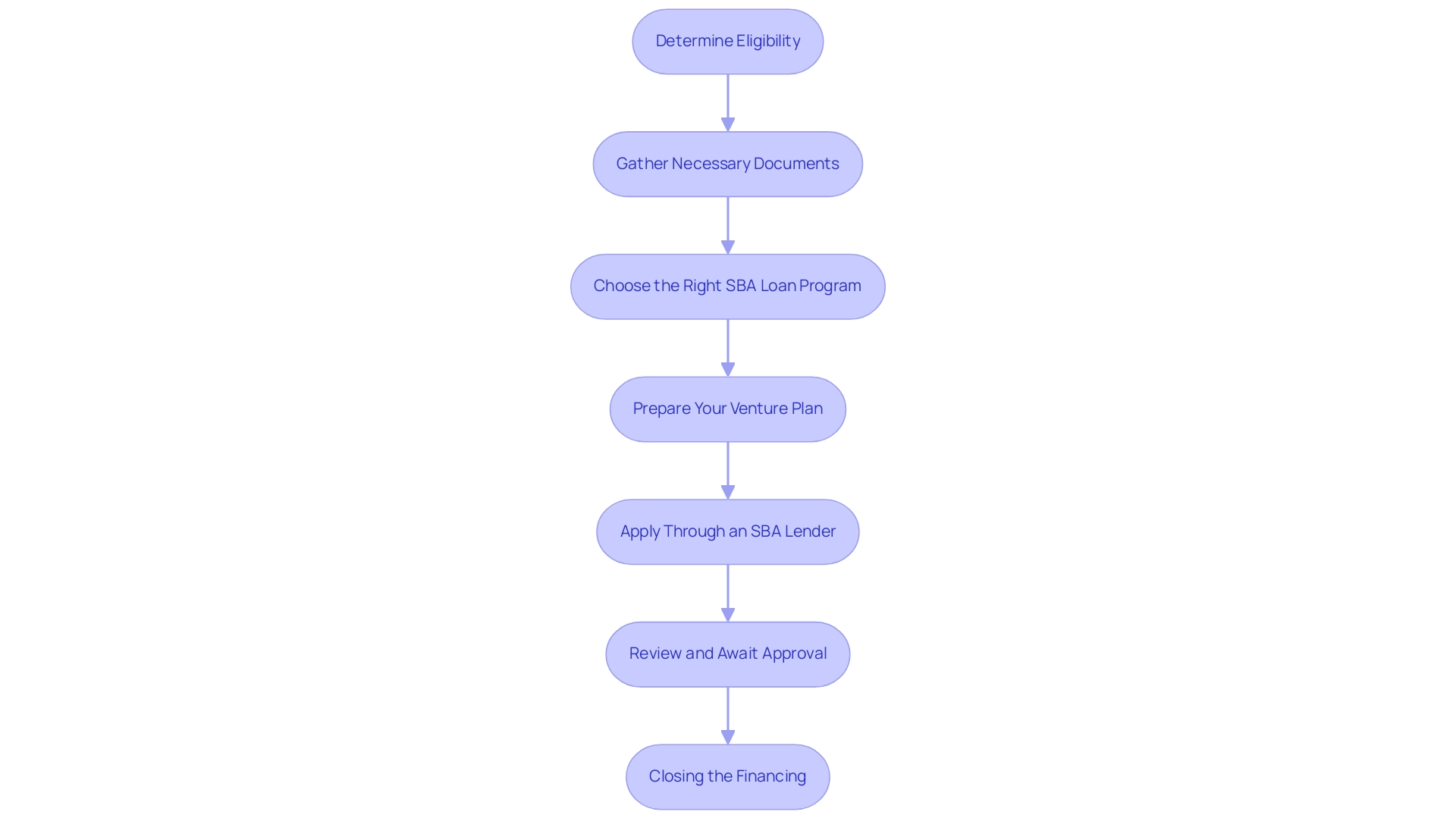
Navigating Challenges: What to Do If Your SBA Loan Application is Denied
If your SBA funding application is denied, follow these steps to navigate the situation:
- Understand the Reason for Denial: Request feedback from your lender to understand why your application was denied. Common reasons include insufficient credit history, inadequate collateral, or incomplete documentation.
- Address the Issues: Once you understand the denial reasons, take steps to rectify them. This may involve improving your credit score, gathering additional financial documentation, or enhancing your business plan.
- Consider Alternative Financing Options: Explore other funding sources, such as personal credit, crowdfunding, or different lenders that cater to business acquisitions, like an SBA loan to buy a franchise. After addressing the issues, consider reapplying for the SBA loan to buy a franchise. Ensure your application is stronger than the previous one by highlighting improvements and providing additional supporting documents.
- Seek Professional Guidance: If you persist in encountering difficulties, think about reaching out to a financial advisor or a consultant who specializes in financing for enterprises. They can provide tailored guidance and strategies.
- Stay Persistent: Remember that many successful business owners faced initial setbacks. Persistence is key, and learning from your experiences will strengthen your future applications.
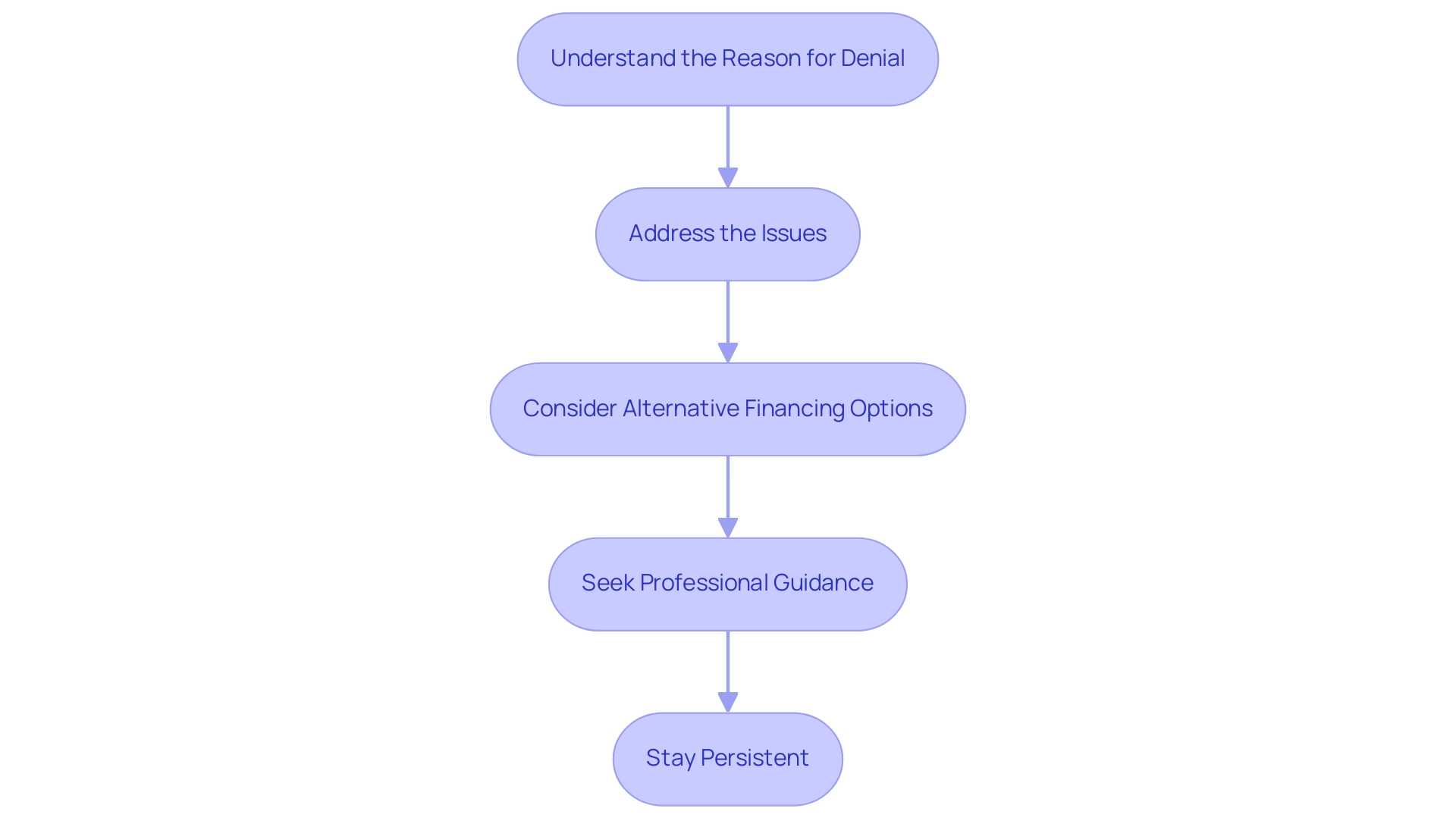
Preparing Your Business Plan for SBA Loan Application
To prepare a successful plan for your SBA loan application, include the following components:
- Executive Summary: Create a brief overview of your venture, including the concept, mission statement, and key objectives.
- Market Analysis: Conduct thorough research on the market, identifying your target audience, competitors, and industry trends. This demonstrates your understanding of the franchise’s potential for securing an SBA loan to buy a franchise.
- Organization and Management: Outline the enterprise structure, including ownership details and management team qualifications. Highlight relevant experience that supports your ability to run the franchise.
- Marketing Strategy: Describe how you plan to attract and retain customers, including pricing, promotion, and distribution strategies.
- Financial Projections: Provide detailed financial forecasts, including projected income statements, cash flow statements, and balance sheets for at least three years. This section should reflect realistic assumptions.
- Funding Request: Clearly outline how much funding you need, how you plan to use it, and your proposed repayment plan. Be specific about the financing terms you are seeking for an SBA loan to buy a franchise.
- Appendix: Include any additional documents that support your business plan, such as resumes, legal agreements, and other relevant information.
By following these guidelines, you can create a comprehensive business plan that effectively communicates your venture’s potential to lenders.
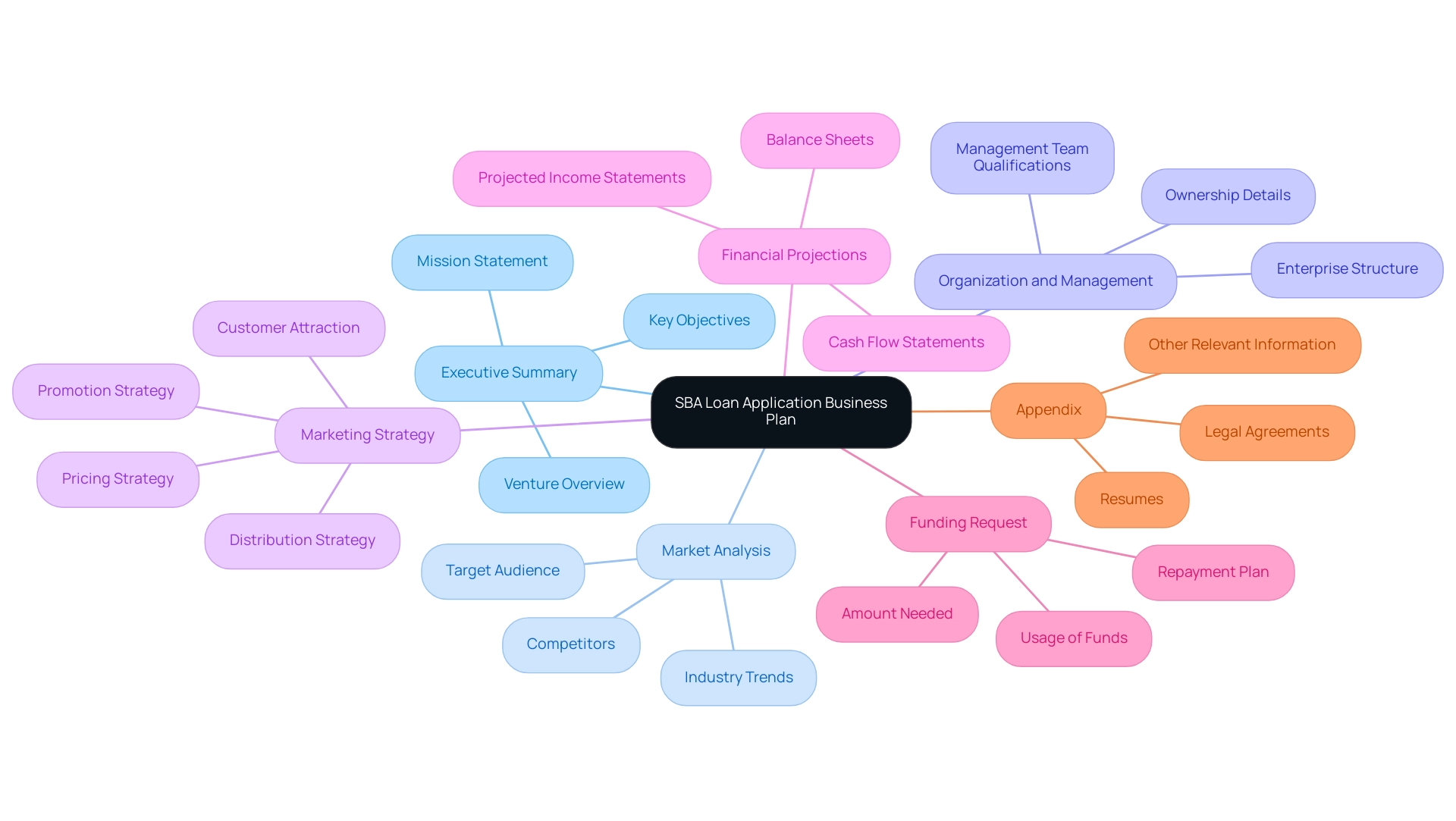
Gathering Required Documentation for Your Application
When applying for an SBA loan, you will need to gather the following documentation:
- Personal Financial Statements: Provide a detailed account of your personal assets, liabilities, and net worth. This helps lenders assess your financial health.
- Business Financial Statements: If your establishment is already operating, include profit and loss statements, balance sheets, and cash flow statements for the past three years.
- Tax Returns: Submit personal and corporate tax returns for the previous three years to provide a comprehensive view of your financial history.
- Franchise Agreement: Include a copy of the franchise agreement, which outlines the terms and conditions of your franchise relationship.
- Strategy Outline: As outlined in the previous section, your strategy outline is a critical component of your application.
- Credit Reports: Obtain and provide your credit reports to give lenders insight into your creditworthiness.
- Legal Documents: Include any relevant legal documents, such as business licenses, permits, and leases.
By preparing these documents in advance, you can streamline your application process and demonstrate your preparedness to lenders.
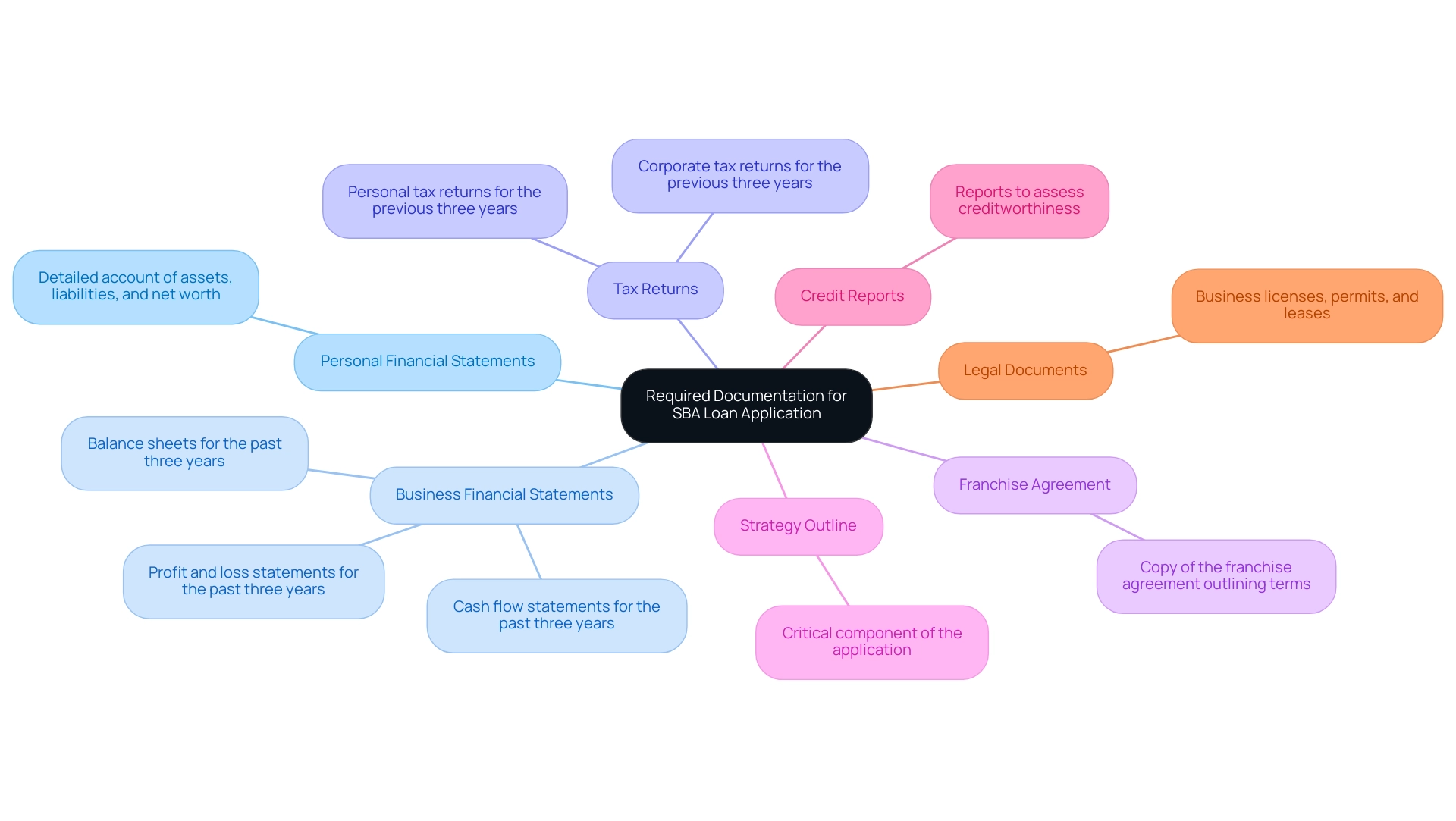
Understanding SBA Loan Terms and Conditions
Getting acquainted with SBA financing terms and conditions is essential. Here are the key components:
-
Interest Rates: SBA financing typically has lower interest rates compared to conventional options, making them more affordable.
Rates can vary depending on the lender and the financing type. -
Funding Amounts: Understand the maximum funding amounts available through different SBA programs. For instance, the 7(a) financing can provide up to $5 million.
-
Repayment Terms: SBA financing typically features extended repayment periods, spanning from 7 to 25 years, based on the category of funding and its intended use. This can ease monthly payment burdens.
-
Collateral Requirements: Be aware that SBA financing may require collateral to secure the funding.
This could include business assets or personal guarantees. -
Fees: Understand any fees associated with the financing, such as guarantee fees or closing costs, which can impact your overall financing costs.
-
Prepayment Penalties: Some loans may have prepayment penalties, so it’s important to know if you will incur fees for paying off your loan early.
By understanding these terms, you can better assess whether an SBA loan aligns with your financial goals and capabilities.
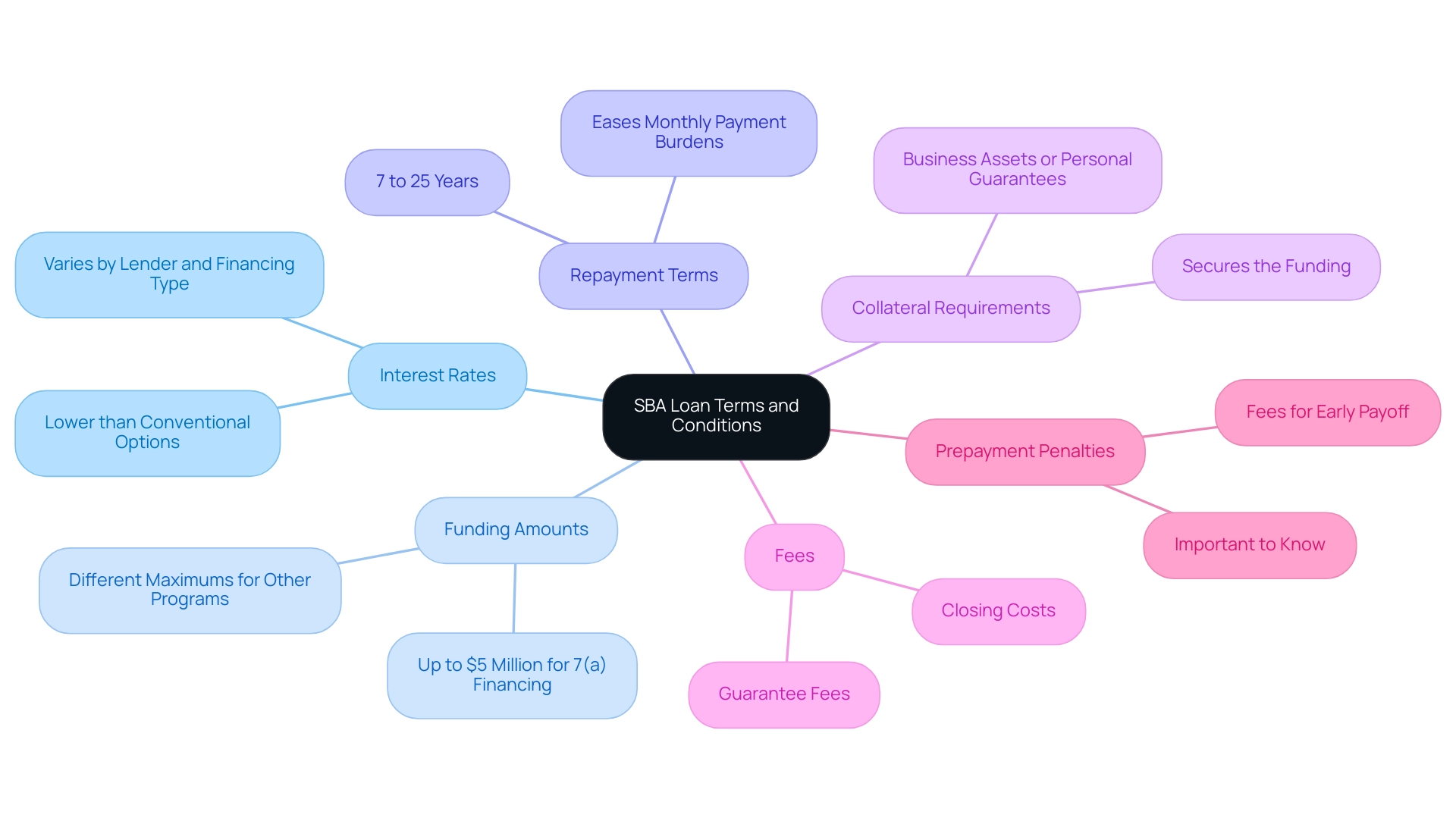
Conclusion
Securing an SBA loan for franchise ownership is indeed a multifaceted journey, requiring careful navigation through eligibility criteria, documentation, and the application process. By understanding the essential steps—such as:
- Determining eligibility
- Preparing a robust business plan
- Gathering the necessary documentation
aspiring franchise owners can significantly enhance their chances of approval.
Moreover, it is crucial to be prepared for potential challenges, including the possibility of a loan denial. By addressing the reasons for denial and exploring alternative funding options, individuals can turn setbacks into opportunities for growth. Persistence and a willingness to adapt will serve as valuable assets in the pursuit of franchise financing.
Ultimately, the path to successful franchise ownership begins with informed preparation and a proactive approach to securing financing. By mastering the intricacies of the SBA loan application process and staying committed to overcoming obstacles, aspiring franchisees can transform their dreams into a thriving reality. The journey may be complex, but with the right knowledge and determination, success is well within reach.


